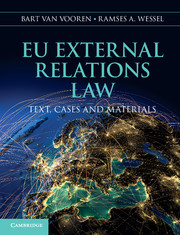Book contents
- Frontmatter
- Contents
- Table of cases
- Table of instruments and legislation
- Preface
- Acknowledgements
- List of abbreviations
- 1 The EU as a global legal actor
- 2 Instruments of EU external action
- 3 Existence of EU external competence
- 4 Nature of EU external competence
- 5 Scope and choice of EU external competence
- 6 The duty of cooperation
- 7 EU law and international law
- 8 The EU and international institutions
- 9 Common Commercial Policy
- 10 EU development policy
- 11 Common Foreign and Security Policy
- 12 Common Security and Defence Policy
- 13 The external dimension of the internal energy market
- 14 The external dimension of freedom, security and justice
- 15 The EU and its neighbours
- Index
- References
10 - EU development policy
- Frontmatter
- Contents
- Table of cases
- Table of instruments and legislation
- Preface
- Acknowledgements
- List of abbreviations
- 1 The EU as a global legal actor
- 2 Instruments of EU external action
- 3 Existence of EU external competence
- 4 Nature of EU external competence
- 5 Scope and choice of EU external competence
- 6 The duty of cooperation
- 7 EU law and international law
- 8 The EU and international institutions
- 9 Common Commercial Policy
- 10 EU development policy
- 11 Common Foreign and Security Policy
- 12 Common Security and Defence Policy
- 13 The external dimension of the internal energy market
- 14 The external dimension of freedom, security and justice
- 15 The EU and its neighbours
- Index
- References
Summary
Central issues
Development cooperation policy is as old as the European integration project itself. Objectives in this policy area have evolved from associating EEC Member States’ colonies with focus on trade and aid, to a progressively broader development agenda incorporating human rights, sustainable development aspects such as environment and social issues, and most recently links to (common foreign and) security policy.
EU development policy can be defined through the three C’s which have been expressly incorporated into the competence-conferring provisions of the TFEU: complementarity, coherence and coordination.
Complementarity is laid down generally in Article 208(1) TFEU, and broadly implies that the exercise of EU and Member State competences shall complement and reinforce each other. From the perspective of the nature of the EU’s development competence, it means that EU action does not pre-empt Member State action (Article 4(4) TFEU), thereby making coherence and coordination between these levels crucial.
Coherence is also contained in Article 208 TFEU and is composed of three aspects: first, coherence of EU development cooperation with the more general principles and objectives of EU external relations (Article 21 TEU); secondly, poverty reduction as the primary policy objective providing intra-policy focus on how diverse development initiatives cohere to the central goal; thirdly, the obligation to take account of development objectives in other policies which are likely to affect developing countries.
Coordination is laid down in Article 210 TFEU, and entails that EU and Member States must proactively collaborate and consult in order to ensure complementarity and coherence of their respective EU development policies. Article 210 TFEU gives the Commission a central role in ensuring coordination of EU and Member State development cooperation initiatives.
- Type
- Chapter
- Information
- EU External Relations LawText, Cases and Materials, pp. 311 - 345Publisher: Cambridge University PressPrint publication year: 2014



